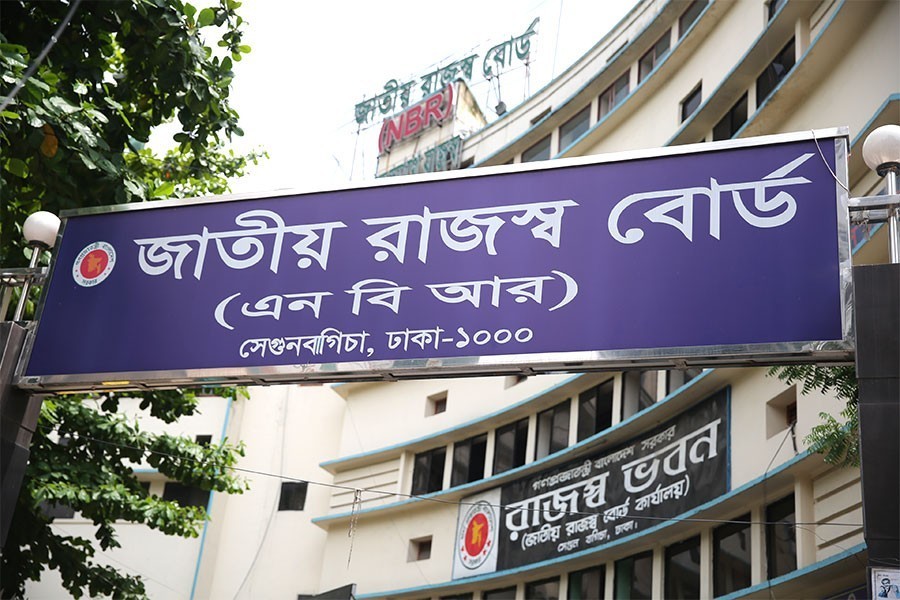
Published :
Updated :

The National Board of Revenue (NBR) has launched reforms since the 1990s, but it has ignored direct tax, undermining the effort to ensure progressive taxation.
Progressive taxation requires the top-earners to pay higher income tax, while the low-income group is subjected to less payment.
Income and wealth inequality in Bangladesh is on the upswing, due in part to the poor attention paid to direct tax collection.
No holistic reform projects have so far been taken to make the income tax wing efficient and payment hassle-free.
All the reform initiatives of the income tax wing were scattered and piecemeal.
The largest project for the income tax wing was the Tax Administration Capacity and Taxpayers Services (TACTS) involving Tk 750 million, followed by the Strengthening Governance Management Project (SGMP) with Tk 510 million loan from the Asian Development Bank (ADB).
Currently, there is no reform project for the income tax wing under the NBR.
However, there are two big projects for VAT and customs involving Tk 6.90 billion and Tk 5.85 billion respectively.
SM Humayun Kabir, direct tax sub-committee convener of the Federation of Bangladesh Chambers of Commerce and Industry, said direct tax reform remains a less-priority topic, although the agenda of the government is to boost its collection.
"The national election this year and the unpleasant experience of the new VAT law implementation may cause the slow pace of income tax reform," he said.
There must be NBR automation or reform projects instead of taking up separate projects for each of its wings, he added.
The compartmentalisation of reform and automation initiatives would not bring any desired results unless the NBR could integrate three of its wings, he said.
The government collects 65 per cent of its tax revenue from indirect tax in the form of Value Added Tax (VAT) and import taxes.
Direct tax collection has contributed an average 35 per cent to the tax revenue during the last five years.
Experts said income and wealth inequality has been widening further with the expansion of VAT net that both the poor and the rich pay equally.
The poor need to pay a large portion of their income as indirect tax while the rich pay their tiny part of income.
Field-level tax offices are still running their activities manually.
Even the large taxpayers' unit (LTU) is also carrying out some of its activities, including audit and monitoring, under the manual system.
Taking the advantage of this system's loopholes, well-off persons do not disclose their actual income and wealth.
In a bid to ensure progressive taxation, the NBR introduced wealth surcharge for the first time in the country during FY 2011-2012.
According to NBR data, a total of 11,670 wealthy people having net asset above Tk 22.5 million paid wealth surcharge worth Tk 3.60 billion during the fiscal year 2016-17.
During 2015-16, some 10,927 well-off people paid Tk 2.54 billion and in 2014-15, some 10,152 people paid Tk 2.08 billion based on their income tax returns.
Candidates of local as well as national level elections in Bangladesh spend billions of taka on campaign but they hardly submit tax returns to hide actual wealth.
NBR chairman Md Mosharraf Hossain Bhuiyan said the board would send a letter to the Election Commission to amend electoral code of conduct to make tax return submission mandatory for the candidates.
"The candidates submit Taxpayers Identification Number (TIN) only by collecting it from somewhere. We will make tax certificates mandatory for them," he said.
In Bangladesh, many people are still out of the tax net, with the taxation to GDP percentage remaining at below 10 over the years, he said.
On direct tax, the NBR chairman said the board is planning a major reform and automation project for the income tax wing.
Zahid Hussain, lead economist of World Bank in Dhaka, said no significant reforms -- policy or administrative -- took place in the direct tax wing.
The policy reform is necessary to reduce the incidence of tax exemption in the form of tax rebate and holidays, he said.
"Multiple tax rates caused tax leakage. Increasing progressivity of tax regime is necessary through policy reform, but attracting investment is also necessary through corporate tax reform," he said.
"I don't see any significant initiative on direct tax reform currently," he said.
During 2010-11, NBR had drafted a new direct tax code with support from the International Finance Corporation (IFC).
It also uploaded the draft law on its website for public opinion.
But tax officials said they have received negative response from the stakeholders on the law.
The drafting of new income tax act in both Bangla and English is underway, they said. (Concluded)


 For all latest news, follow The Financial Express Google News channel.
For all latest news, follow The Financial Express Google News channel.